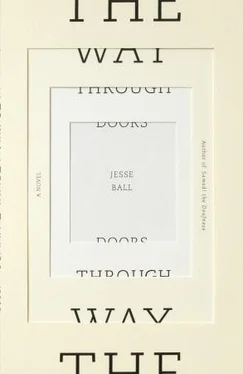He came up and patted her on the shoulder.
— There, there, he said. I’m sure it’s all right.
— But it isn’t, she said. It isn’t at all. He’s not here, and he should be, and I’ve been waiting for simply hours, and I can’t imagine where he could be, and oh, but it’s useless.
She started to cry again.
The old man took out an extraordinarily beautiful and elegant handkerchief and gave it to her to dry her tears. It was the sort of handkerchief that one might be content to be judged by if it was all that remained of one after one’s death.
Mora didn’t especially look at it, but held it in her hands and used it to cover her face a moment.
— He’s probably been held up somewhere, said the old man. It happens all the time. One wants to be somewhere, but one has first one thing to attend to and then another. Not to mention the fact that it isn’t in the first place easy to get from here to there, even when one knows where here is and where there is. Not presupposing such a knowledge, how can we be surprised when a person fails to get from one location on our broad-domed earth to another? And furthermore, there are opponents, men, women, beasts, objects, streets, buildings, lairs, condescensions, militancies, a hundred ways and means that oppose any kind of successful action, and most especially the sort of special action that would bring a likely young fellow to your side. For he is a likely young fellow, isn’t he?
— The likeliest sort, said Mora, sobbing.
— There was a time, said the old man, when I kept an inn in Som. I had a bird there that would sing to me. It sang very quietly, but sometimes it would sing human songs, and it was those songs that I liked best. Here is one now.
The old man began to sing. His voice was very lovely and obviously a part of something that the world had disposed of in its haste, evidence of a grander, kinder past.
Now as I rode out over London Bridge
On a misty morning early
I overheard a fair pretty maid
A cry for the life of her Geordie
Go bridle to me a milk white steed
Bridle me a pony
I’ll ride down to London town
And I’ll plead for the life of my Geordie
Mora closed her eyes and felt her way in the darkness of her head. It was a song! Such a fine song. She never had been given such a fine song all alone in a square.
For he never stole ox he never stole ass
He never murdered any
He stole sixteen of the King’s wild deer
He sold them in Bohenny
Oh I wish I had you in yonder grove
Where times I have been many
With my broadsword and a pistol too
I’d fight you for the life of me Geordie.
The old man sang for a while, and Mora felt in her head the beginning of a long siege. A wilderness had crept up around a walled town, and the darkness of old woods and far-off places began to grow then, even within sight of where men walked together.
By this she meant in her heart that all the useless things one remembers well just before waking and forgets just after were in fact very important and perhaps all that stood now between herself and oblivion.
A small bird, a sparrow, in no wise capable of the song the old man had been singing, flew down and snagged a hair out of Mora’s braid with its sharp little beak. She opened her eyes in shock and slapped at it with her hand, but it dodged sideways in the air and flew off before she could manage another blow.
— How fortunate! said the old man. If that had happened to a Roman general, a great victory would have followed.
But even then the bird was flying off over the rooftops. It flew west across the rooftops to the river, and headed south along the river until it came to a place where not one but two bridges cross. It flew down beneath the first, and landed upon a stoop. A Chinese man was sitting in a plastic chair. It landed on his right knee, dropped the hair into his hand, and flew off.
Just then a car sailed out of the right side of the picture and pulled up before the stoop. Two men leaped out and the car whisked away. One was very well dressed in a fine suit. The other wore the simple attire of the sort of person perhaps who researches sin in the depths of the Vatican but is not a priest at all and goes often flower picking in the country by himself, never speaking to anyone he sees there.
— Hello, he said in Cantonese.
— Hello, returned the municipal inspector.
In the man’s head then, the idea of the bird landing on his knee and dropping the hair. This idea only partly in Cantonese and partly in the contusions of the man’s thought.
— (This idea said out loud in just that way by the guess artist.)
The man understood immediately. He held up the hair for them to look at. He gave it to the municipal inspector because he liked his suit very much. The municipal inspector understood and took the hair. He did not understand that it was Mora’s hair. The Cantonese man snatched the hair back when he saw that the municipal inspector was going to put it into his pocket the way it was. Very neatly and rapidly, he fashioned the hair into a tiny sculpture of a rabbit, knotting and reknotting it. The hair had not seemed to be very long or thick until the man did this. When finished, he handed the little hair-rabbit to the municipal inspector, who held it proudly upon the palm of his hand.
— Not bad, said the guess artist.
The man gestured with his hand that if they chose, they might enter the building. This they did. It was an ordinary-enough-looking building, a rather downtrodden three-story affair on a dim street, and above, the westward beginnings of the Manhattan Bridge (which lent a darkness to the whole affair).
Inside, there was a filthy sort of passage that led to either a stair or a hall to the building’s rear. As the stair only went up, and presumably the larger portion of what they hoped for was down, they took the hall. It was lined with doors whose filthiness equaled that of their surroundings.
On then to the back of the hall. At the back of the hall there was a large round trapdoor made of malachite.
The two looked at each other in shock.
— How will we ever lift that? said Selah.
The guess artist reached down and tried to lift it at the edge. It didn’t budge. Both tried then to lift it at the edges. Still nothing.
Selah drew out the map once more.
— It seems we must go downstairs in order to go upstairs, he said. In fact, I drew a staircase and pushed so hard with the crayon that the paper is broken. It doesn’t say anything about a malachite door.
— What if we both jump on it?
They tried that. It made a loud, hollow sound, but nothing happened other than that the noise of their jumping attracted the Chinese man, who came down the hall. He shook his head at them and said something to them in Cantonese. They did not know what he had said, but they got off the malachite plug and stood dutifully patient by the near wall.
He knelt down and pushed on one section of the malachite. The disc spun up then, revealing a ladder on one side leading down. Selah inclined his head to the Chinese man in thanks, and the guess artist bowed. Then down the ladder they went. It is a curious thing about such ladders. One doesn’t know what is at the bottom, but because there is a ladder, one feels comfortable enough to go. Were there simply a craggy cliff face that was perhaps just as easy to climb as a ladder, the whole affair would seem more forbidding. But the fact that a human being has put in place a system for getting up and down in some way pleases, gratifies, and comforts us. Which it shouldn’t, as men are the ones most likely to construct difficult and irrational traps, having as their purpose only to confound us.
Читать дальше












